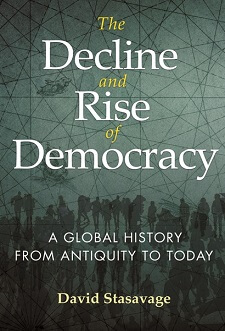The Decline and Rise of Democracy: A Global History from Antiquity to Today
23 February 2022
Book Review
David Stasavage, The Decline and Rise of Democracy: A Global History from Antiquity to Today. Princeton, New Jersey: Princeton University Press, 2020.
The author innovatively combines political science, economic and anthropological perspectives to understand why some places are democratic, and others are not. He defines two types: early and modern democracy. The former occurs in weakly governed states with small-scale settlements, dispersed populations, and exit options for unhappy citizens. These jurisdictions are "weak" because the regime has a low tax collection rate, often because it's difficult to determine how much tax to collect. Leaders make deals with citizens to consult with them and get help in raising taxes in return.
On the other hand, autocracy thrives when citizens don't have an exit option: think Egypt with citizens living along the Nile surrounded by desert. It is also more likely to occur in large, dense jurisdictions where agricultural productivity is easy to determine, helping regimes determine the appropriate tax rate. Leaders appoint and build up a bureaucracy to support the work of the government. The poster child of autocracy from the get-go is China. A large, dense population growing crops easy to store at predictable productivity levels provided ideal conditions for autocrats and bureaucracy. Most Middle Eastern countries started as early democracies. Then the rapid conquests following the birth of Islam favored autocracy because of the increasing size of the empire, and technical advances in writing, math, and accounting allowing autocrats to collect taxes without the need for democratic consultation.
Modern democracy first appeared in the USA, building on hundreds of years of innovation in Britain, including the end of mandates, the notion of representation, and the expansion of those entitled to vote. A key challenge for modern democracy is that participation is widespread but shallow, leading to citizen distrust of government in many settings. Countries with early democracy are more likely to adopt modern democracy.
This hugely ambitious story inevitably leaves things out for future analysis. For example, the author finds that democratic values emerged independently in many parts of the world, as they are part of human nature. Other scholars have found that core democratic values move from one region and culture to another, even when the source is less technologically advanced than the receiver. For example, native American notions of liberty and mutual aid reported by European explorers and missionaries were critical to the emergence of these ideas in Europe's "enlightenment" (Graeber and Wengrow, 2021).
China's autocratic history is a crucial feature of the argument: because of this history and the conditions favoring it today, China remains autocratic. But why is Taiwan democratic? And why do so many in Hong Kong want to be democratic?
Most rich countries are democratic. Does that mean democracy is best for economic development? No, it's an accident of history that wealth grew fastest in Europe and its offshoots, which tended to be democratic. Of course, autocracies can also get rich, though we haven't seen many cases where autocracies have broken through the middle-income trap: only Singapore and Hong Kong so far, a point not discussed by Stasavage.
Then there's the question: Should aid agencies support democratic governance in developing countries, and if so, how should they do it? Stasavage rightly points out that governance improvements depend mainly on the work of local citizens. He also correctly points out that having low incomes isn't necessarily a barrier to democracy: France adopted modern democracy in the 19th century when its per capita income was the same as Senegal's or Tanzania's today. Yet aid programs often strengthen bureaucracies and tax collection in client countries, including autocracies. Is this preventing the emergence of democracy, even in fertile ground places because they were a site for early democracy? Governance advisors in aid agencies should read this work carefully.
Reference
Graber, D. & Wengrow, D. (2021). The Dawn of Everything: A New History of Humanity. New York: Farrar, Straus, and Giroux.
Note
A previous version of this review was published in International Public Management Review 21(2).
Clay Wescott, President, International Public Management Network and member of International Advisory Board at Centre for Governance Studies (CGS)
